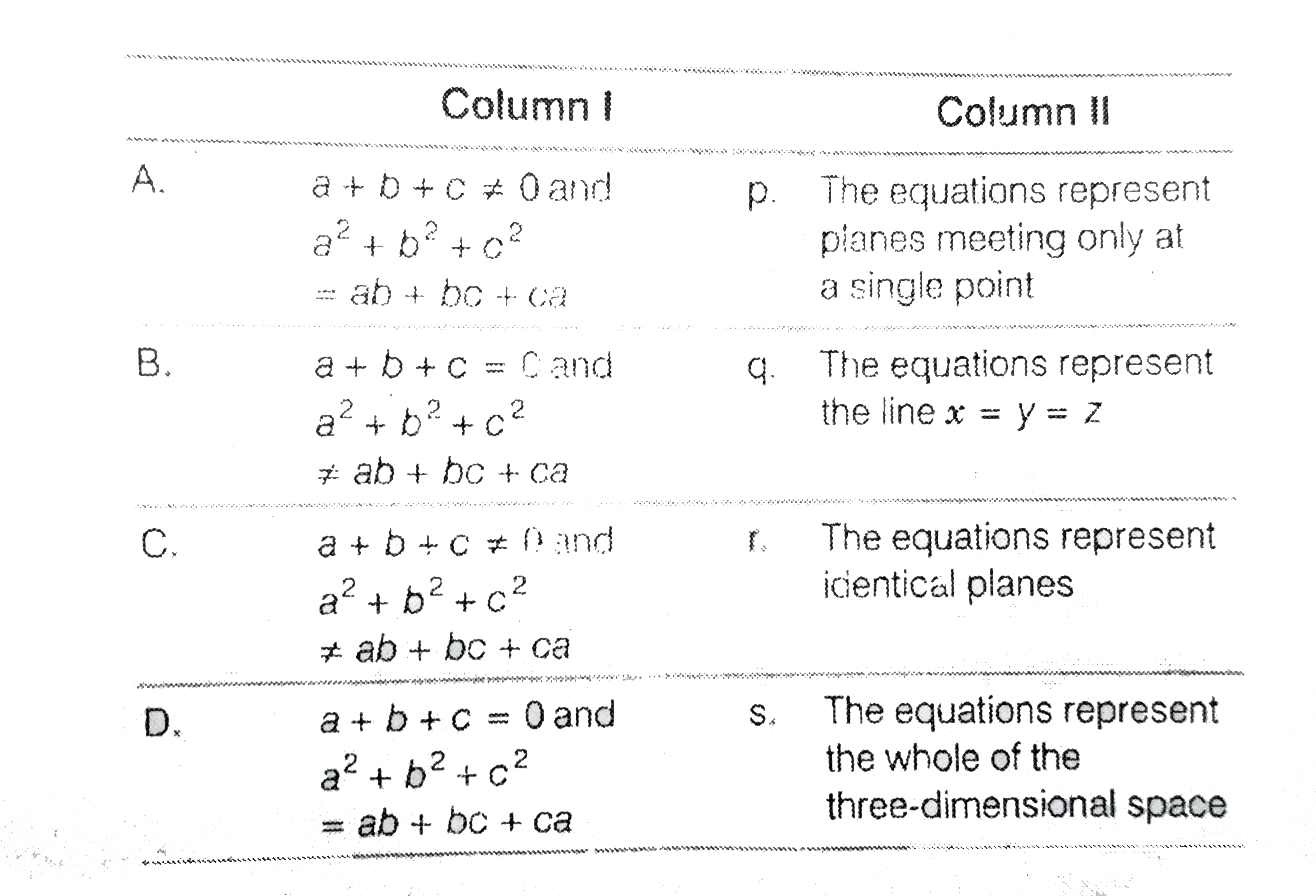Consider the system of equations ax+y+bz=0,bx+y+az=0andax+by+abz=0 where a,b∈{0,1,2,3,4}. The number of ordered pairs (a, b) for which the system has non - trivial solutions is
The correct Answer is:6
To determine the number of ordered pairs (a,b) for which the given system of equations has non-trivial solutions, we start by analyzing the system of equations:
1. ax+y+bz=0
2. bx+y+az=0
3. ax+by+abz=0
Step 1: Write the system in matrix form
We can represent the system of equations in matrix form as follows:
⎡⎢⎣a1bb1aabab⎤⎥⎦⎡⎢⎣xyz⎤⎥⎦=⎡⎢⎣000⎤⎥⎦
Step 2: Find the determinant of the coefficient matrix
For the system to have non-trivial solutions, the determinant of the coefficient matrix must be zero. We need to compute the determinant:
Δ=∣∣
∣∣a1bb1aabab∣∣
∣∣
Step 3: Calculate the determinant
Using the determinant formula for a 3x3 matrix:
Δ=a∣∣∣1abab∣∣∣−1∣∣∣baaab∣∣∣+b∣∣∣b1ab∣∣∣
Calculating each of these 2x2 determinants:
1. ∣∣∣1abab∣∣∣=1⋅ab−a⋅b=ab−ab=0
2. ∣∣∣baaab∣∣∣=b⋅ab−a⋅a=ab2−a2
3. ∣∣∣b1ab∣∣∣=b⋅b−1⋅a=b2−a
Substituting these back into the determinant:
Δ=a(0)−1(ab2−a2)+b(b2−a)
=−ab2+a2+b3−ab
=a2−ab2+b3−ab
Step 4: Set the determinant to zero
We want to find when Δ=0:
a2−ab2+b3−ab=0
Step 5: Factor the equation
Rearranging gives:
a2−ab+b3−ab2=0
Factoring out common terms, we can rewrite it as:
a(a−b)+b(b2−a)=0
This gives us two cases:
1. a=0
2. a=b2
Step 6: Analyze the cases
- Case 1: a=0
If a=0, then b can take any value from \{0, 1, 2, 3, 4\}. This gives us the pairs:
(0,0),(0,1),(0,2),(0,3),(0,4) → 5 pairs.
- Case 2: a=b2
Now we check for values of b from \{0, 1, 2, 3, 4\}:
- If b=0, a=02=0 → (0, 0)
- If b=1, a=12=1 → (1, 1)
- If b=2, a=22=4 → (4, 2)
- If b=3, a=32=9 → Not valid since a must be ≤ 4.
- If b=4, a=42=16 → Not valid since a must be ≤ 4.
From this case, we have the pairs:
(0,0),(1,1),(4,2) → 3 additional pairs.
Step 7: Count the total pairs
Combining both cases, we have:
- From Case 1: 5 pairs
- From Case 2: 3 pairs
Total ordered pairs = 5+3=8.
Final Answer
The number of ordered pairs (a,b) for which the system has non-trivial solutions is 8.
2. bx+y+az=0
3. ax+by+abz=0
We can represent the system of equations in matrix form as follows:
For the system to have non-trivial solutions, the determinant of the coefficient matrix must be zero. We need to compute the determinant:
∣∣a1bb1aabab∣∣
∣∣
Using the determinant formula for a 3x3 matrix:
=−ab2+a2+b3−ab
=a2−ab2+b3−ab
We want to find when Δ=0:
Rearranging gives:
2. a=b2
- Case 1: a=0
(0,0),(0,1),(0,2),(0,3),(0,4) → 5 pairs.
- If b=0, a=02=0 → (0, 0)
- If b=1, a=12=1 → (1, 1)
- If b=2, a=22=4 → (4, 2)
- If b=3, a=32=9 → Not valid since a must be ≤ 4.
- If b=4, a=42=16 → Not valid since a must be ≤ 4.
(0,0),(1,1),(4,2) → 3 additional pairs.
Combining both cases, we have:
- From Case 1: 5 pairs
- From Case 2: 3 pairs
The number of ordered pairs (a,b) for which the system has non-trivial solutions is 8.
Topper's Solved these Questions
Similar Questions
Consider the linear equations ax + by + cz = 0, bx + cy + az=0 and cx + ay + bz=0
View SolutionGiven a,b∈{0,1,2,3,4.............,9,10). Consider the system of equations x+y+z=42x+y+3z=6x+2y+az=b Let L: denotes number of ordered pairs (a, b) so that the system of equations has unique solution M: denotes number of ordered pairs (a, b) so that the system of equations has no solution and N: denotes number of ordered pairs (a, b) so that the system of equations has infinite solutions.Find (L+M−N).
View Solution
Knowledge Check
If the system of equations
x+y+z=0
ax+by+z=0
bx+y+z=0
has a non trivial solution thenAb2=2b+1Bb2=2b−1Cb−a=0Db2=2bIf the system of equations
bx+ay=c,cx+az=b,cy+bz=a
has a unique solution, thenAabc=1Babc=−2Cabc≠0Dnone of thesex+ay=0,y+az=0,z+ax=0 The value of a for which the system of equations has infinitely many solutions is
Aa = 1Ba = 0Ca = -1Dno value
Consider the following linear equations
ax+by+cz=0,bx+cy+az=0,cx+ay+bz=0

View SolutionConsider the following linear equations
ax+by+cz=0,bx+cy+az=0,cx+ay+bz=0

View SolutionConsider the following linear equations
ax+by+cz=0,bx+cy+az=0,cx+ay+bz=0

View SolutionThe system of equations ax-y- z=a-1 ,x-ay-z=a-1,x-y-az=a-1 has no solution if a is
View SolutionThe system of equations ax−y−z=a−1,x−ay−z=a−1,x−y−az=a−1 has no solution, if a is
View Solution
